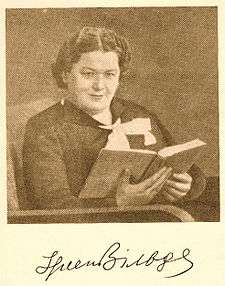Iryna Vilde
| Iryna Vilde | |
|---|---|
|
Ukrainian writer, Iryna Wilde | |
| Born |
Daryna Makohon May 5, 1907 Chernivtsi, Austro-Hungarian monarchy. |
| Died |
October 30, 1982 (aged 75) Lviv, Ukraine, URSR, |
| Education | University of John II Casimir in Lwow (Polish: Uniwersytet Jana Kazimierza we Lwowie; Uniwersytet Jana Kazimierza (1919-1939)) |
| Occupation | Ukrainian writer |
| Spouse(s) | Yevhen Polotniuk |
Iryna Vilde, a pen name of Daryna Dmytrivna Polotniuk[1] (Ukrainian: Дарина Дмитрівна Полотнюк, née Makohon Ukrainian: Макогон), was a Ukrainian writer and Soviet correspondent. She was married to Yevhen Polotniuk who in 1943 was shot by the Gestapo.
Vilde was born on May 5, 1907 in Chernivtsi, Austro-Hungarian monarchy. She died after a long illness October 30, 1982 and was buried at the Lychakivskiy Cemetery in Lviv.
Her father was the folk lecturer and writer Dmytro Makohon. Her mother Adolphina Janiszewska was a teacher.
Childhood and studies
Vilde was born and brought up in a perfect the family where reigned the cult of kindness, respect and intelligence. In an atmosphere of undeniable respect for the mother and of his father the sample of public of virtues.
In 1927 she graduated in Stanislav private school. She graduated from Lviv University in 1932 "University of John II Casimir in Lwow" (Polish: Uniwersytet Jana Kazimierza we Lwowie; Uniwersytet Jana Kazimierza (1919-1939)), which is soon due to material deprivation was forced to leave and got a job in the magazine Zinocha dolia (Women's fate) in Kolomyia, where she worked until 1939.
Literary creativity
From 1930 to 1939 she published a number of short stories and novels about the life of the Western Ukrainian intelligentsia, the petty bourgeoisie and students. The first short story of the young writer Povist zyttia (Life Story) appeared in print in 1930. In 1935 - for the first time under the pseudo “Iryna Vilde” was published the novel Metelyky na shpyl’kakh (Pinned Butterflies).


During the war period, and after the reunification of Western Ukraine with Ukrainian SSR, she continued to describe the familiar themes of family in bourgeois society. She is the author of many short stories, novellas and novels. Her works containing a huge number of characters - protagonists from all public layers of Galicia - the clergy, employees, workers, peasantry, petty bourgeoisie, as well as information on the activities of various parties and public organizations, the Polish administration policy, the economy, education and culture.
Among them - the anthology of short stories Khymerne sertse (The Whimsical Heart, 1936), the novelettes Metelyky na shpyl’kakh (Pinned Butterflies, 1936), the story Povnolitni dity (Grown-up Children, 1939), B’ie vos'ma (The Clock Strikes Eight, 1936).
Her postwar works - Nashi bat'ky roziishlysia (Our Parents Have Separated, 1946), Iii portret (Her Portrait 1948), Stezhynamy zhyttia (Along the Paths of Life, 1949), Ti z Kowalskoi (Those of Kowalska, 1947), Iabluni zatsvily vdruhe (The Apple Trees Have Blossomed Again, 1949), Povisti ta opovidannia (Tales and Stories" 1949 ), Zhyttia til’ky pochynaiet’sia (Life Is Just Beginning, 1961), Troiandy i ternia (Roses and Thorns, 1961), the novel Sestry Richynski (The Richynsky Sisters, 2 vols, 1958, 1964) and many others. "Sisters Richynski" - the most creative achievement of the writer.
Iryna Vilde has been laureate of literary awards named after Ivan Franko, Taras Shevchenko in 1965 she was awarded the Order of Badge of Honor. She was a member of the Writers' Union and was put into the UNESCO list of known people of the 20th century.
Iryna Vilde wrote: "To enter into immortality, man must draw up two exams: one in front of his contemporaries, the second - before history." Exam for contemporaries she has passed. Now will speak story.
References
- Internet Encyclopedia of Ukraine. Vilde, Iryna
- «Дика» письменниця Ірина Вільде (Ukrainian)
- Vil’de, Irina
- Сторінки пам’яті Володимира Івасюка. Спогади. (Ukrainian)
- Біографії, життєписи, творчість Ірина Вільде (Ukrainian)
- Iryna Vilde (Polotniuk)
